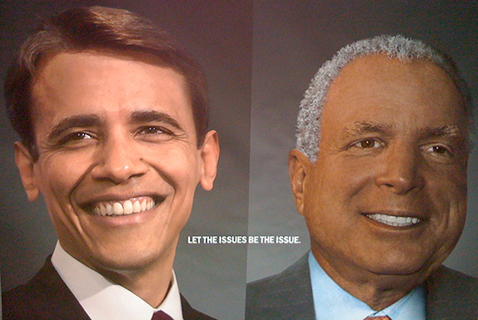So long as the Republicans fail to stage the greatest voting fraud in history, Barack Obama will win the US Presidency tomorrow night in a historic landslide.
I'm interested in what Dissensus contributors think the Obama Event means for politics - in the widest possible sense - more generally.
To get the ball rolling, here is my opening contribution:
Obama has cleared the ground of identity politics - whether understood culturally, racially, or in its class-identity disguise - and established a new political paradigm for the Left grounded on transversal. This paradigm, oddly, owes something to Spinoza - witness Obama's revealing statement, apropos of Jeremiah Wright, that "his comments we're not only wrong, but divisive, divisive at a time we need unity." Unity is apparently a greater virtue for Obama than right or wrong - a claim that makes perfect logical sense if Spinoza's claim that Being is univocal can be granted.
Obama's taste for transversals is also evident in his approach to foreign policy. There was a very interesting article on this theme in the New Yorker recently, in which it was claimed:
Obama wants to “build a new international consensus around the challenges of transnational threats.” Of great-power competition as the defining element in statecraft, he writes, “That world no longer exists.” Instead of Russia and China, we should be focussed mainly on “terrorist networks intent on repelling or disrupting the forces of globalization, potential pandemic disease like avian flu, or catastrophic changes in the earth’s climate,” and the way to make headway there is by bringing together multinational coalitions and adding new elements to the traditional foreign-policy tool kit.
As [Anthony Lake, an Obama foreign policy adviser] put it, when I spoke to him, traditional statesmen see international relations as a game of chess, and “post-realists” see it as more like the complicated multidirectional Japanese board game of Go—“but Obama knows you have to play both boards at the same time.” (In the Obama camp, all dichotomies are false dichotomies, which the candidate transcends.)
This statement not only calls to my mind Deleuze and Guattari's comments on Go in A Thousand Plateaus, but seems to surpass it...
The article is available here:
http://www.newyorker.com/reporting/2008/10/13/081013fa_fact_lemann
I'm interested in what Dissensus contributors think the Obama Event means for politics - in the widest possible sense - more generally.
To get the ball rolling, here is my opening contribution:
Obama has cleared the ground of identity politics - whether understood culturally, racially, or in its class-identity disguise - and established a new political paradigm for the Left grounded on transversal. This paradigm, oddly, owes something to Spinoza - witness Obama's revealing statement, apropos of Jeremiah Wright, that "his comments we're not only wrong, but divisive, divisive at a time we need unity." Unity is apparently a greater virtue for Obama than right or wrong - a claim that makes perfect logical sense if Spinoza's claim that Being is univocal can be granted.
Obama's taste for transversals is also evident in his approach to foreign policy. There was a very interesting article on this theme in the New Yorker recently, in which it was claimed:
Obama wants to “build a new international consensus around the challenges of transnational threats.” Of great-power competition as the defining element in statecraft, he writes, “That world no longer exists.” Instead of Russia and China, we should be focussed mainly on “terrorist networks intent on repelling or disrupting the forces of globalization, potential pandemic disease like avian flu, or catastrophic changes in the earth’s climate,” and the way to make headway there is by bringing together multinational coalitions and adding new elements to the traditional foreign-policy tool kit.
As [Anthony Lake, an Obama foreign policy adviser] put it, when I spoke to him, traditional statesmen see international relations as a game of chess, and “post-realists” see it as more like the complicated multidirectional Japanese board game of Go—“but Obama knows you have to play both boards at the same time.” (In the Obama camp, all dichotomies are false dichotomies, which the candidate transcends.)
This statement not only calls to my mind Deleuze and Guattari's comments on Go in A Thousand Plateaus, but seems to surpass it...
The article is available here:
http://www.newyorker.com/reporting/2008/10/13/081013fa_fact_lemann

